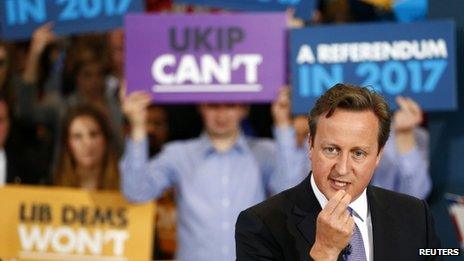David Cameron: Conservatives can win general election
- Published

David Cameron says the party needs to work harder to win over voters
David Cameron has insisted the Conservatives can win the next general election despite being pushed into third place in the European elections.
The prime minister said he appreciated people were "disillusioned" with the EU and he "absolutely understood and received the message".
He told the BBC that only Conservatives offered a referendum on UK membership.
The BBC's Nick Robinson said this "simple message" instilled confidence for many within the party.
UKIP gained 23 MEPs, with the Tories having 19, behind Labour which has 20. The Conservative share of the vote was 23.9%, behind Labour on 25.4% and UKIP on 27.5%.
Some Conservative MPs have expressed dismay at the performance and Mr Cameron said he was "disappointed" for the MEPs - including its former leader in Brussels Martin Callanan - who lost their seats.
'Clear message'
But he said the vote reinforced his belief that the UK's relationship with the EU needed to change.
"I take a very clear message from the election. People are deeply disillusioned with the EU. They don't feel the current arrangements are working well enough for Britain and they want change.
"I would say that message is absolutely received and understood."
While he was an instinctive "reformer" who, in the referendum would "give the choice to the British people of whether to stay or go", Labour backed the "status quo" in Europe and the Lib Dems did not want any change.
Mr Cameron rejected suggestions that UKIP's victory was a snub for the Westminster elite in general and for Mr Farage's different campaigning style, saying the UKIP leader was a "consummate politician" who was already discussing tactics for the 2015 general election.
He again dismissed any talk of pre-election pacts, at either a national or constituency level, saying he was "100%" focused on delivering an outright Conservative victory.
He said Labour had got a lower share of the vote in the 2004 European election and managed to comfortably win a general election the year after.
"It is possible to win from here," he said. "We have just got to have a real focus on what really matters which is completing our economic plan and turning our country round."
Foreign Secretary William Hague said the rise of Eurosceptic parties should serve as a wake-up call to European politicians.
'Free hit'
UKIP's support would switch for next year's general election, he told BBC News. "They can have a free hit; they can have a vote that does not have the consequences of bringing the wrong government in," he said.
"So it is very different to a general election."
But backbencher Bernard Jenkin wrote on Twitter: "Some of us who opposed Maastricht 20 years ago predicted it would lead to the rise of the right in the EU: and here we are."
And Clacton MP Douglas Carswell added: "So maybe those of us who sometimes banged on about Europe were on to something?"
The European election results come just days after the Conservative Party lost more than 200 seats in local polls, prompting ministers to promise tougher curbs on immigration.
Home Secretary Theresa May said they were considering deporting people who came to the UK to work, but who could not find a job after six months.
They were also looking at cutting the length of time migrants could claim benefits from six months to three months, she said.
Conservative party chairman Grant Shapps said the election results were "a command for Britain to get a better deal" in Europe - but he rejected calls by Tory grandee David Davis to bring forward a proposed in/out EU referendum to 2016, saying negotiations on this could not be rushed.